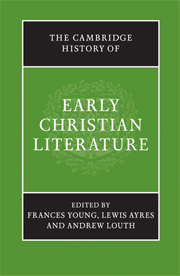19 - Christian teaching
from B - CONTEXT AND INTERPRETATION
Published online by Cambridge University Press: 28 March 2008
Summary
With unprecedented breadth and depth in the work of Origen of Alexandria, Christian teaching in the third century displayed a complex integration of spiritual sensibility, textual interpretation, and philosophical reflection. Such multifaceted Christian teaching unfolded amidst a developing Neoplatonist philosophical and pedagogical tradition which, from Plotinus to Proclus, sought a comparable spiritual, textual and metaphysical synthesis. Although the tradition of moral and intellectual transformation to which both Christian and polytheist Platonists were indebted was firmly rooted in the dialogues of Plato, by the end of the third century AD, Plato’s heirs had diverged from the master’s teaching in a variety of ways. Their chief departure was a thoroughgoing effort to recover the pedagogical significance of authoritative texts – for the Christian Platonists, the books of the Old and New Testaments; for the polytheist Platonists, a variety of Greek poetic texts, pre-eminently the Homeric epics.
The distinctiveness of Christian teaching in the third century is not to be found in formal interpretative techniques such as allegorical reading, which leading intellectuals like Origen shared with fellow Platonists concerned to demonstrate the coherence of spiritual and metaphysical teaching with traditional texts. Nor can Christian distinctiveness be located simply in the extent to which Christian theologians tried to show the biblical character of their conceptual reflections, for both Christian and non-Christian Platonists were increasingly concerned to display just such integration of textual explication and philosophical reflection. Instead, Christian teaching diverged from polytheist Platonist teaching in distinctive ways according to the degree and manner in which authoritative texts were allowed to shape thought and behaviour in ways deemed consonant with the character of the stories they told.
Keywords
Information
- Type
- Chapter
- Information
- The Cambridge History of Early Christian Literature , pp. 222 - 238Publisher: Cambridge University PressPrint publication year: 2004
References
Accessibility standard: Unknown
Why this information is here
This section outlines the accessibility features of this content - including support for screen readers, full keyboard navigation and high-contrast display options. This may not be relevant for you.Accessibility Information
- 1
- Cited by
